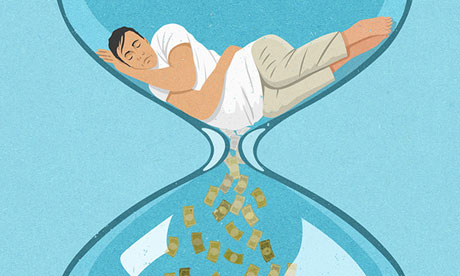
The Money Shredding Alarm Clock – details of which surfaced online a few weeks ago – surely signifies the end of the long-running quest to design the most effective way of waking up. More evil than Clocky, the alarm clock that rolls away when you reach out to silence it, or the Puzzle Alarm, which makes you complete a simple puzzle before it'll go quiet, the Money Shredding Alarm Clock methodically destroys your cash unless you rouse yourself. It isn't mentioned in Jonathan Crary's fascinating new book 24/7: Late Capitalism And The Ends Of Sleep, but I suspect he'd regard it with both horror and a sense of vindication, since it's the perfect metaphor for his argument. In a consumer society, the official point of life is to make money, then use it to buy things. Lazing in bed sets you back in this interminable rat race. The Money Shredding Alarm Clock simply makes all that more literal: you snooze, you lose.
Crary's (broadly Marxist) thesis is that sleep is one of the last remaining spaces of resistance to capitalism's unremitting march. The world is becoming "a non-stop work site or an always-open shopping mall of infinite choice", yet you can't work or shop when you're sleeping. "The huge portion of our lives that we spend asleep, freed from a morass of simulated needs, [remains] one of the great human affronts to the voraciousness of contemporary capitalism," he writes. In an increasingly individualised world, sleep is also oddly communal: every time you drift off, you're entrusting yourself to your society – if only by your faith that no one will murder you in your sleep.
It's hardly surprising, from this perspective, that sleep is under attack. One in three British workers is chronically sleep-deprived, we're told; celebrity business leaders like to boast about rising early, while those lower down the ladder, saddled with shiftwork and lengthy commutes, have no choice but to sleep fewer hours. The American military is leading research into drugs, dietary changes and hi-tech breathing masks that might greatly reduce the need for sleep, while smartphones and iPads take over our bedrooms, their glowing screens disrupting our rest. Tech culture is even helping cheapen the very concept of sleep, Crary notes: "sleep mode" on your laptop just means it's waiting until it can be productive again.
The 24/7 world obliterates rhythms – days and nights, work and play, the seasons. Sleep is the only guaranteed daily change of pace. Even the idea of a single sleep every 24 hours is a concession to industralisation: left to their own devices, some research suggests, people revert to sleeping in two portions, with a few hours' quiet wakefulness in between, reminiscent of the "first sleep" and "second sleep" common in medieval England.
At this point, though, if you're familiar with the world of productivity blogs and business self-help books, an objection might occur. These days, their authors seem obsessed with the importance of getting enough sleep. But does this really undermine Crary's case? Arguably, it's just one more way for capitalism to colonise sleep: not by eroding it, but by redefining it as mere preparation for more work. Productivity advice increasingly has this nurturing feel: get enough rest! Spend more time in nature! Take a digital detox! But it's still productivity advice, and so there are pressing questions to be asked. Sure, it helps you get more done, but is it the stuff you want to be getting done? And whose interests are you serving by doing it?
oliver.burkeman@theguardian.com
Follow Oliver on Twitter

